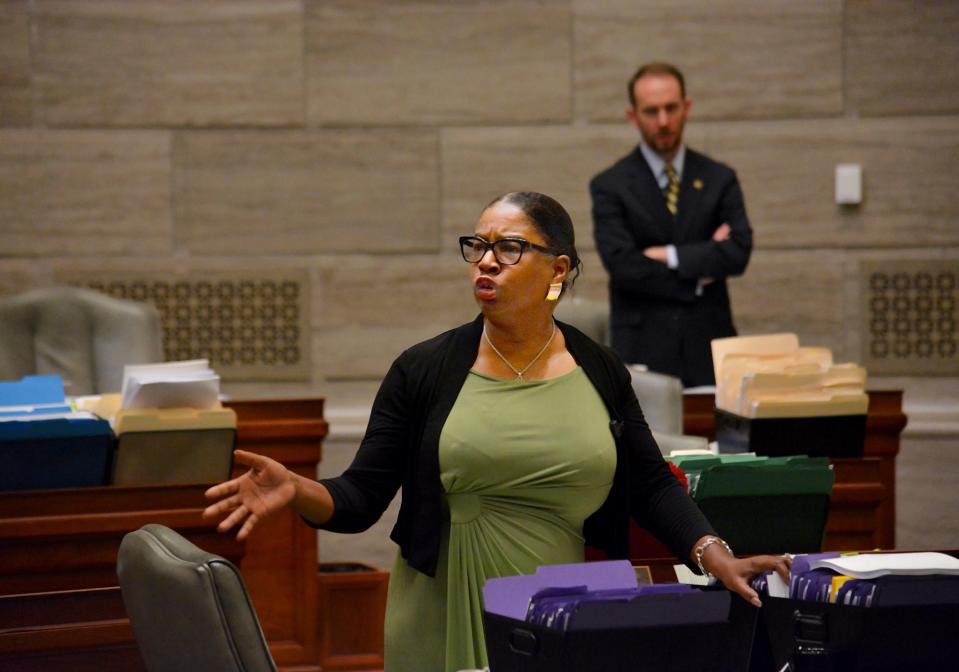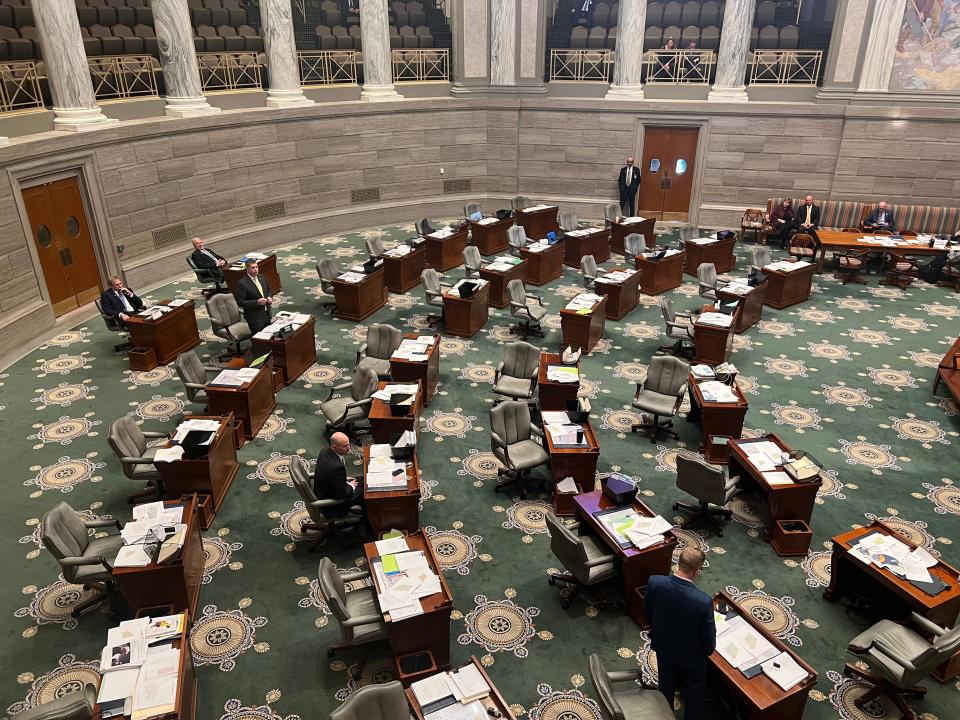Education bill restricting how schools can teach race, history advances in Missouri Senate
- Oops!Something went wrong.Please try again later.
JEFFERSON CITY — The Missouri Senate is advancing a bill that aims to restrict how schools teach concepts of race and racism, despite sharp opposition from Black members of the chamber.
St. Louis Republican Sen. Andrew Koenig's legislation would bar schools from teaching that people of one race are inherently superior or inferior, that people of one race should be treated differently based on their race, and that individuals bear guilt or responsibility for historic actions committed by others.
Koenig and Republican supporters tout Senate Bill 4 as a necessary response to what they view as a broader culture of "radical" teachings in schools, stemming from left-wing political theory about race. But Democratic senators, especially Black Democrats, have warned that the bill could be broadly interpreted to halt discussions about Missouri's African-American history and the role of racism through slavery, segregation and other systems of law.
"However tough this conversation is, it's a conversation that needs to happen in this American system," said Sen. Karla May, a St. Louis Democrat. "White people do not want this taught because you have been in control of the educational system in the state of Missouri."

Missouri legislature:Senate weighs how schools should talk about race and gender
The legislation clarifies that its restrictions do not apply to protected speech under the First Amendment, voluntary trainings or orientations, or access to materials that advocate for the restricted concepts. It also allows for classroom discussions and curriculum on "sexism, slavery, racial oppression, racial segregation, affirmative action, or racial discrimination," including laws and systems that resulted from those concepts.
But opponents to the bill have argued that regardless of those exceptions, the legislation could still have a chilling effect for sensitive conversations relating to Black history and racism, with teachers potentially opting to avoid the topics altogether rather than wading into uncertain waters. Under the proposal, parents are able to file a complaint with the state education department, allowing them to be reimbursed by the school if the school is found in violation of the law.

Absent from the legislation is the term "critical race theory," a graduate-level academic and legal framework that was also restricted in a previous version of the bill, though it was not defined. The phrase was removed from the current version of the bill. Koenig had argued that the concept had "left the universities long ago, and has manifested itself in society ever since."
Senate President Pro Tem Caleb Rowden acknowledged Thursday that the legislation as written could present court challenges.
"I think any language that you pass where you're defining and guiding conversation relative to what's admissible and what's not, it's open for lawsuits in any scenario," Rowden said, calling the bill "a first step, but a really good step."
Democrats said they still disliked the bill and intended to vote against it, but were able to insert some provisions that they believed diluted its authority.
"I do still feel that this bill is about defunding public education," said Sen. Barbara Washington, a Kansas City Democrat.
More:SPS wants Missouri legislature to continue teacher pay raises, stay out of curriculum
Legislation could funnel money to family accounts established under school choice law
Under the most recent version of the bill, parents are allowed to file a complaint with the Department of Elementary and Secondary Education if they believe their child's school violated the terms of the law. The state board of education would then hold a contested case hearing between the parent and school within 30 days.
If the district is found to have violated the law, the school is required to pay the parent annually until their student turns 18. The annual payment would be equal to the "state adequacy target," which a DESE spokesperson said is $6,375.
That money would be deposited in a state account for the family, established as part of a 2021 law — also led by Koenig — to allow for families to pay for their children's tuition at private or other schools of their choice. The money would be used "for educational purposes only."

Districts required to post curriculum online under transparency requirements
Also included in the legislation is a slate of new requirements for districts to post their textbooks, curriculum, syllabi, guest speakers and salaries online for the public to see. In particular, the bill flags all presenters and materials for programs and training related to diversity, equity and inclusion efforts.
The language represents a priority of lawmakers last session, often referred to by supporters as the "Parents' Bill of Rights," as they scrutinized the curriculum, guest speakers and other programming within classrooms, particularly as they pertain to race and diversity.
Opponents of the legislation have argued that curriculum is already available to parents who wish to see it and contact schools, and express concern that it could place a further burden on schools' administrative staff and teachers.
Galen Bacharier covers Missouri politics & government for the News-Leader. Contact him at gbacharier@news-leader.com or on Twitter @galenbacharier.
This article originally appeared on Springfield News-Leader: Bill restricting race, history curriculum advances through MO Senate

